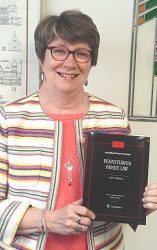Attorneys named among best in greater Philadelphia area for family law, workers’ compensation and business law.
NORRISTOWN, Pa. (July 31, 2017) – High Swartz LLP, a full-service law firm with offices in Norristown and Doylestown, Pennsylvania, is pleased to announce that its attorneys have been named among the “Top Attorneys” for 2017 by Suburban Life magazine.
 The attorneys receiving the honors include Mary Cushing Doherty, who was recognized for her excellence in the practice area of family law and divorce, Thomas E. Panzer for workers’ compensation, and Joel D. Rosen who was recognized in the practice area of business law.
The attorneys receiving the honors include Mary Cushing Doherty, who was recognized for her excellence in the practice area of family law and divorce, Thomas E. Panzer for workers’ compensation, and Joel D. Rosen who was recognized in the practice area of business law.
A former member of the Board of the Pennsylvania Bar Institute and former Chair of the Family Law Sections of the Pennsylvania Bar Association, Philadelphia Bar Association and the Montgomery Bar Association, Doherty has more than 35 years of legal experience in the area of family law.
Active in local politics in Bucks County, Panzer serves as the county’s elected Treasurer. He focuses his practice on workers’ compensation, handling both claimant and defense matters, which has made him a sought-after and frequent lecturer on Pennsylvania workers’ compensation topics.
The managing partner of High Swartz, Rosen focuses his practice on franchise law, business and commercial law, employment law, trademark/copyright law and commercial leasing. He serves on the board of directors for several area nonprofits, including the Hepatitis B Foundation, Pennsylvania Biotechnology Center and Baruch S. Blumberg Institute, and the Montgomery Bar Foundation.
The annual list of Top Attorneys in Suburban Life highlights the best legal practitioners from the greater Philadelphia area who focus their legal practices in a wide range of practice areas, from business law to criminal defense, medical malpractice and more.
High Swartz LLP is a general practice law firm serving clients in the Delaware Valley and throughout Pennsylvania from offices in Norristown and Doylestown. Established in 1914, High Swartz serves the needs of businesses, municipalities, government entities, nonprofits and individuals. With offices in Bucks County and Montgomery County, the full-service law firm provides comprehensive counsel and legal support to individuals and business entities of all sizes across a broad spectrum of industries throughout Pennsylvania and New Jersey. For more information, go to www.highswartz.com.
# # #




 Many of the sessions at the conference focused on the financial implications of divorce, including financial issues that affect the baby boomer generation. Doherty participated in a program entitled “Conquering Executive Compensation,” which explored the compensation packages being offered by the most financially sophisticated companies and discussed ways to identify, value, and distribute these complex assets during a divorce or custody action. Doherty was joined on the panel by family law attorney Mary Vidas and financial experts Sandra R. Klevan, CPA, and John Petrancosta, CPA.
Many of the sessions at the conference focused on the financial implications of divorce, including financial issues that affect the baby boomer generation. Doherty participated in a program entitled “Conquering Executive Compensation,” which explored the compensation packages being offered by the most financially sophisticated companies and discussed ways to identify, value, and distribute these complex assets during a divorce or custody action. Doherty was joined on the panel by family law attorney Mary Vidas and financial experts Sandra R. Klevan, CPA, and John Petrancosta, CPA.
 NORRISTOWN, Pa. (July 12, 2017) – Pennsylvania family law attorney
NORRISTOWN, Pa. (July 12, 2017) – Pennsylvania family law attorney 
